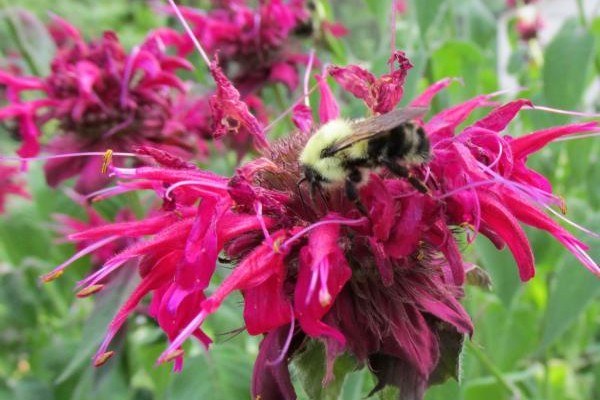Master Gardeners are available to answer questions about vegetables; flowers; fruit trees; native plants; pollinators and other wildlife; lawns; composting; houseplants; environmental stewardship; and many other topics.

Photo credit: Master Gardener Deb Liguori
There are several ways to contact us:
- Call the Clinton County Master Gardener hotline at 570-858-0198
- e-mail questions to clintonmg@psu.edu
- Visit the Penn State Extension Office in Clinton County at 47 Cooperation Lane, Mill Hall, PA 17751
- Visit the Ask a Master Gardener table at community events
Soil Test Kits and Water Test Kits
Soil test kits and water test kits can be purchased at most Penn State Extension county offices or ordered online directly from the lab.
Plant Pathology Services
If the Garden Hotline is unable to diagnose your plant disease, the Penn State Plant Disease Clinic remains open and is accepting samples. The Clinic is accepting digital sample submissions and encourages submission of photos before mailing samples. Digital samples can be sent to PlantClinic@psu.edu. If necessary, physical samples can be mailed to the clinic via US Mail, FedEx and UPS. See the Clinic website for more specific information on submitting digital and physical samples.
Insect ID Services
Digital specimens can be sent to Michael Skvarla at mxs1578@psu.edu. Still photographs are preferred as they have higher resolution than videos. Please include details that will help with the identification, such as where the insect was found (state and city, as well as finer details such as "in my kitchen"), host plant (if it's a plant pest), and the damage caused/problem description. Please do not send a blank email with only photographs and no text describing the issue.
Physical specimens
Please include a completed Identification Request Form with all physical samples.
Most physical specimens should be preserved in 70% alcohol (ethanol is preferred, isopropyl/rubbing alcohol is acceptable; both are available at most pharmacies) in a liquid-tight container, such as a small jar. The container should be double bagged in self-sealing plastic bags (such as Ziplock bags) to prevent leakage during shipment and shipped in a box or other rigid container.
Samples that include plant material should be double bagged and shipped in a box or other rigid container. Do not preserve plant material in alcohol.
Specimens that are shipped in non-rigid containers such as padded envelopes are frequently destroyed during shipping and identification of poorly preserved specimens may not be possible.
Please do not send samples that are removed from the body or contain bodily fluids. The lab is not equipped to handle potentially bio-hazardous material and such samples will be discarded without being opened.
Physical specimens should be shipped to:
Insect Identification Laboratory
Department of Entomology
501 Agricultural Science & Industries Building
University Park, PA, 16802

